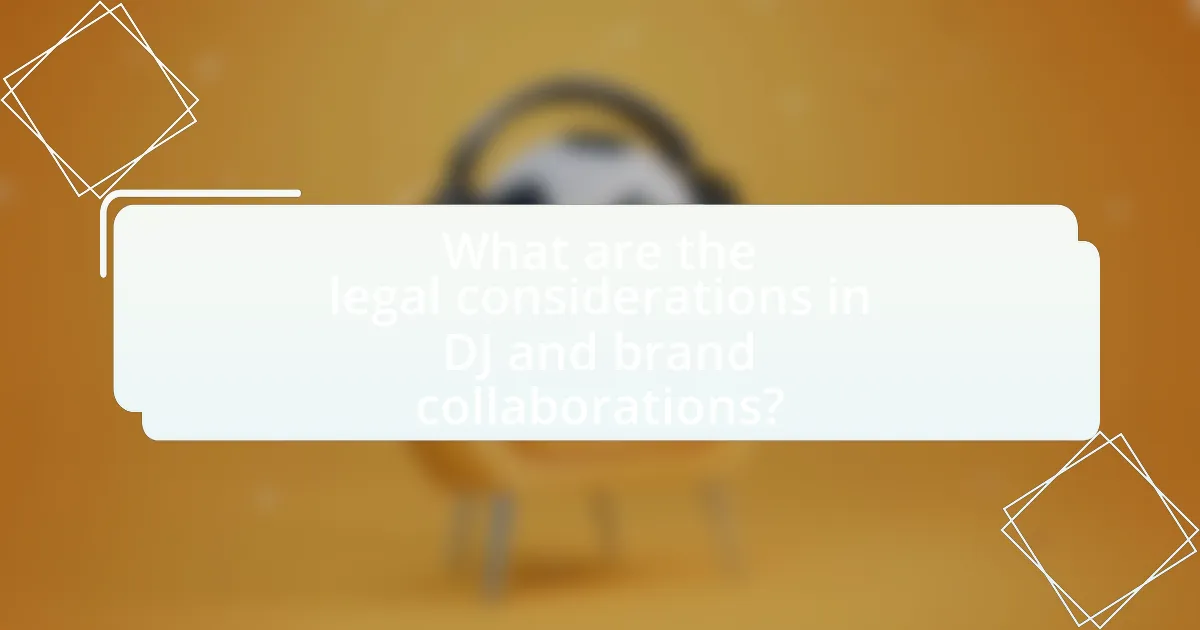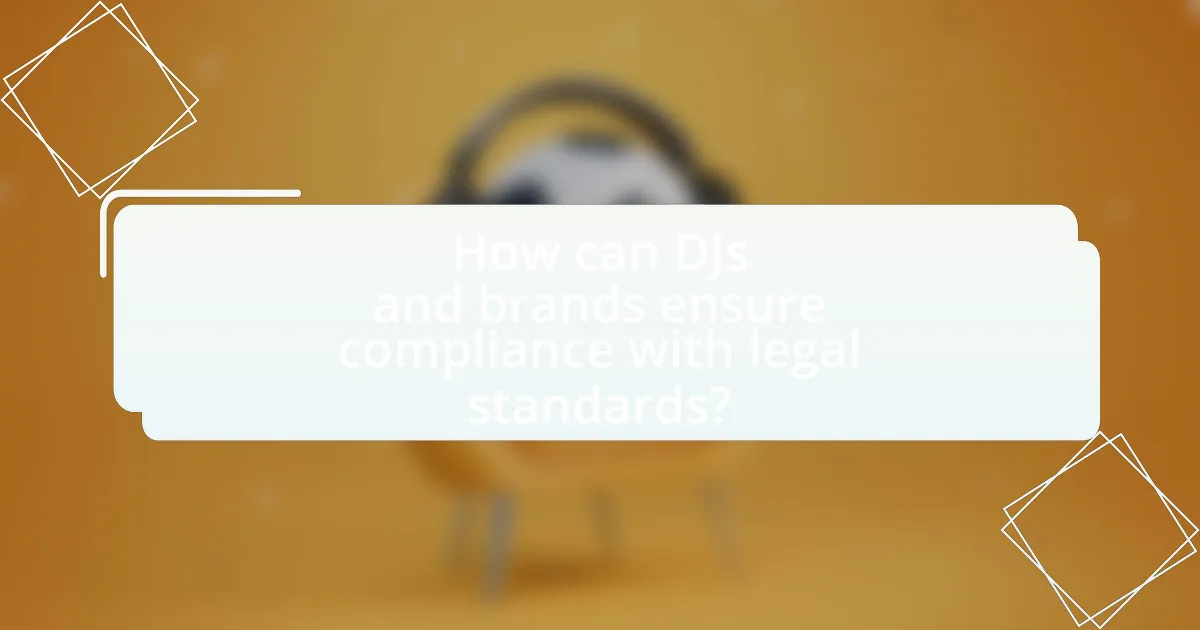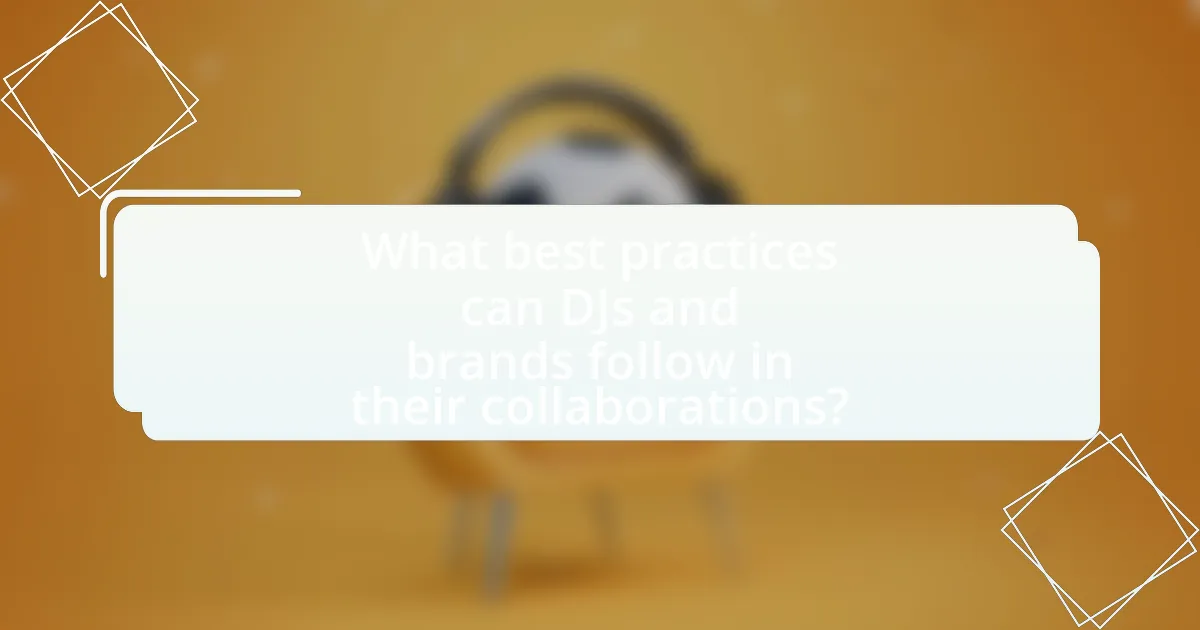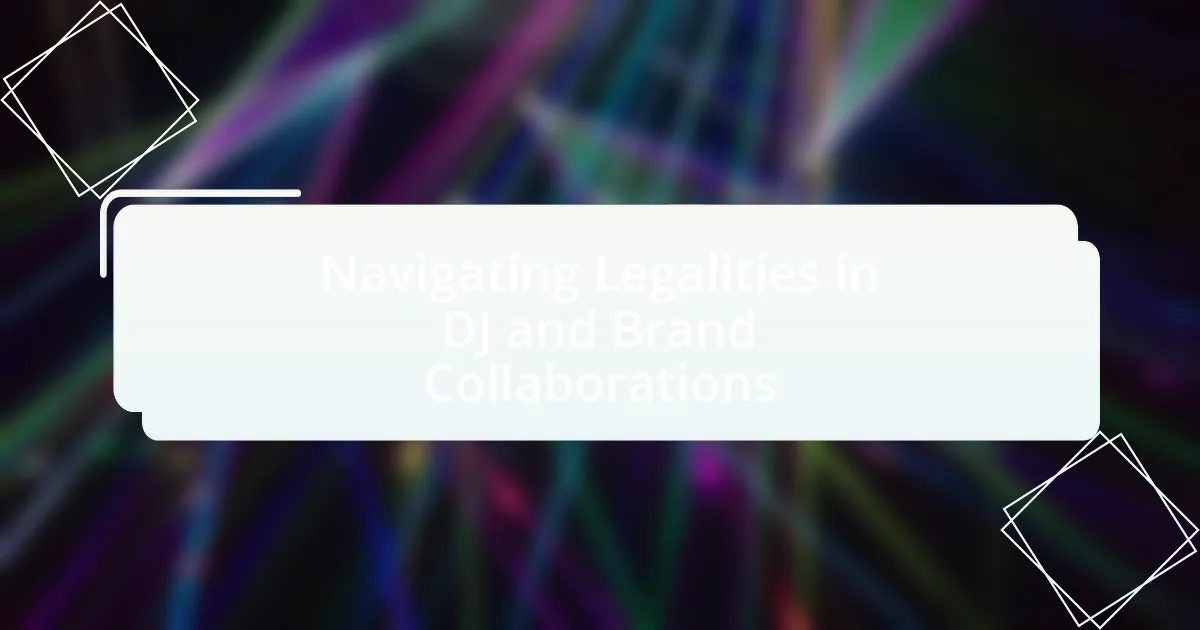The article focuses on the legal considerations involved in DJ and brand collaborations, emphasizing the importance of intellectual property rights, contract agreements, and compliance with advertising regulations. It outlines the critical role of contracts in defining terms, responsibilities, and expectations, while highlighting key elements that should be included to protect both parties. The article also addresses potential legal risks, such as copyright infringement and breach of contract, and provides guidance on ensuring legal compliance and conducting due diligence. Additionally, it discusses best practices for effective communication and dispute resolution, aiming to foster successful partnerships in the music industry.

What are the legal considerations in DJ and brand collaborations?
Legal considerations in DJ and brand collaborations include intellectual property rights, contract agreements, and compliance with advertising regulations. DJs must ensure that any music used in promotional materials does not infringe on copyright laws, as unauthorized use can lead to legal disputes. Additionally, clear contracts should outline the terms of collaboration, including payment, deliverables, and ownership of created content. Compliance with advertising regulations, such as disclosing sponsorships, is also crucial to avoid legal repercussions. These considerations are essential for protecting both the DJ’s and the brand’s interests in a collaboration.
How do contracts play a role in DJ and brand collaborations?
Contracts are essential in DJ and brand collaborations as they outline the terms, responsibilities, and expectations of both parties involved. These legal documents ensure clarity regarding compensation, usage rights of music and branding, performance obligations, and the duration of the partnership. For instance, a contract may specify the payment structure, whether it is a flat fee or a percentage of sales, and detail how the DJ’s image and music can be used in promotional materials. By formalizing these agreements, contracts protect both the DJ and the brand from potential disputes, ensuring that both parties adhere to the agreed-upon terms. This legal framework is crucial for fostering trust and accountability in collaborations, ultimately contributing to successful partnerships.
What key elements should be included in a collaboration contract?
A collaboration contract should include key elements such as the scope of work, roles and responsibilities, compensation details, intellectual property rights, confidentiality clauses, and dispute resolution procedures. The scope of work defines the specific tasks and deliverables expected from each party, ensuring clarity in collaboration. Roles and responsibilities outline who is accountable for what, preventing misunderstandings. Compensation details specify payment terms, including amounts and timelines, which are crucial for financial transparency. Intellectual property rights clarify ownership of any created content, protecting both parties’ interests. Confidentiality clauses safeguard sensitive information shared during the collaboration. Finally, dispute resolution procedures provide a framework for addressing conflicts, ensuring a structured approach to resolving issues. These elements are essential for a legally binding and effective collaboration contract.
How can DJs protect their rights in a collaboration agreement?
DJs can protect their rights in a collaboration agreement by ensuring that all terms are clearly defined and documented in writing. This includes specifying ownership of the music, revenue sharing, and the scope of each party’s contributions. Clear documentation helps prevent disputes and provides legal recourse if disagreements arise. According to the American Bar Association, written agreements are essential in the music industry to safeguard intellectual property rights and outline responsibilities, thereby minimizing potential conflicts.
What are the potential legal risks involved in these collaborations?
The potential legal risks involved in DJ and brand collaborations include intellectual property infringement, breach of contract, and liability for damages. Intellectual property infringement can occur if copyrighted music or trademarks are used without permission, leading to lawsuits and financial penalties. Breach of contract risks arise when either party fails to fulfill agreed-upon terms, which can result in legal disputes and loss of reputation. Liability for damages may stem from accidents or misconduct during events, exposing both DJs and brands to claims for compensation. These risks highlight the importance of clear agreements and legal compliance in collaborations.
How can copyright issues arise in DJ and brand partnerships?
Copyright issues can arise in DJ and brand partnerships primarily through the unauthorized use of copyrighted music and branding elements. DJs often remix or sample existing tracks, which can infringe on the original artist’s copyright if proper licenses are not obtained. Additionally, when brands collaborate with DJs, they may use the DJ’s name, image, or music without securing the necessary rights, leading to potential legal disputes. For instance, a DJ’s performance at a brand event may involve playing copyrighted tracks without permission, exposing both the DJ and the brand to copyright infringement claims.
What are the implications of trademark laws for DJs and brands?
Trademark laws significantly impact DJs and brands by protecting brand identity and preventing unauthorized use of trademarks. For DJs, this means they must ensure their stage names, logos, and any branding elements do not infringe on existing trademarks, which could lead to legal disputes or loss of reputation. Brands collaborating with DJs must also be cautious, as using a DJ’s trademarked name or likeness without permission can result in legal action. According to the United States Patent and Trademark Office, trademark infringement can lead to damages, including lost profits and legal fees, emphasizing the importance of conducting thorough trademark searches and obtaining necessary licenses before any promotional activities.

How can DJs and brands ensure compliance with legal standards?
DJs and brands can ensure compliance with legal standards by obtaining the necessary licenses for music usage and adhering to advertising regulations. This involves securing performance rights from organizations like ASCAP or BMI for public performances and ensuring that promotional materials meet FTC guidelines for endorsements. Compliance is critical, as failure to do so can result in legal penalties, including fines and lawsuits, which have been documented in cases where artists or brands faced litigation for unauthorized use of copyrighted material.
What steps should be taken to verify legal compliance?
To verify legal compliance, organizations should conduct a thorough review of applicable laws and regulations relevant to their industry. This involves identifying specific legal requirements, such as contracts, intellectual property rights, and labor laws, that pertain to DJ and brand collaborations. Additionally, organizations should implement regular audits and assessments to ensure adherence to these legal standards. For instance, a study by the American Bar Association highlights that regular compliance audits can reduce legal risks by up to 30%. Furthermore, consulting with legal professionals who specialize in entertainment law can provide tailored guidance and ensure that all aspects of the collaboration meet legal obligations.
How can DJs conduct due diligence on brands before collaboration?
DJs can conduct due diligence on brands before collaboration by researching the brand’s reputation, financial stability, and past partnerships. This involves analyzing online reviews, social media presence, and industry feedback to gauge public perception. Additionally, DJs should review the brand’s financial health through available reports or industry analyses to ensure they are partnering with a stable entity. Examining previous collaborations can provide insights into the brand’s reliability and professionalism, as well as any potential legal issues that may have arisen. By gathering this information, DJs can make informed decisions that align with their values and career goals.
What resources are available for understanding legal requirements?
Legal requirements can be understood through various resources, including government websites, legal textbooks, and online legal databases. Government websites, such as those of the U.S. Small Business Administration and the Federal Trade Commission, provide guidelines on compliance and regulations relevant to businesses. Legal textbooks offer comprehensive insights into specific areas of law, while online legal databases like Westlaw and LexisNexis provide access to case law, statutes, and legal commentary. These resources are essential for individuals and businesses seeking to navigate the complexities of legal obligations effectively.
Why is it important to consult legal professionals in collaborations?
Consulting legal professionals in collaborations is crucial to ensure compliance with laws and regulations. Legal experts provide guidance on contracts, intellectual property rights, and liability issues, which are essential for protecting the interests of all parties involved. For instance, a study by the American Bar Association highlights that 70% of business disputes arise from poorly drafted agreements, underscoring the importance of professional legal input in preventing conflicts.
What types of legal professionals should DJs consider consulting?
DJs should consider consulting entertainment lawyers, intellectual property attorneys, and contract specialists. Entertainment lawyers can provide guidance on industry-specific regulations and rights, while intellectual property attorneys help protect original music and branding. Contract specialists ensure that agreements with venues, promoters, and brands are legally sound and enforceable, minimizing potential disputes. These legal professionals are essential for navigating the complexities of contracts, copyright issues, and industry standards in DJ and brand collaborations.
How can legal advice prevent future disputes?
Legal advice can prevent future disputes by ensuring that contracts are clear, comprehensive, and legally enforceable. When DJs and brands engage in collaborations, legal counsel can identify potential areas of conflict, such as intellectual property rights, revenue sharing, and performance obligations. By addressing these issues upfront, legal advice minimizes misunderstandings and sets clear expectations for all parties involved. For instance, a study by the American Bar Association found that well-drafted contracts significantly reduce the likelihood of litigation, highlighting the importance of legal guidance in collaborative agreements.

What best practices can DJs and brands follow in their collaborations?
DJs and brands should establish clear communication and mutual goals as best practices in their collaborations. Clear communication ensures that both parties understand expectations, deliverables, and timelines, which minimizes misunderstandings. Setting mutual goals aligns the collaboration’s direction, enhancing the effectiveness of marketing strategies. For instance, a successful partnership between a DJ and a beverage brand can be seen in the collaboration between DJ Khaled and Pepsi, where both parties aimed to reach a younger audience through engaging content. This approach not only maximizes brand visibility but also strengthens the relationship between the DJ and the brand, leading to more successful future collaborations.
How can clear communication enhance collaboration outcomes?
Clear communication enhances collaboration outcomes by ensuring that all parties have a mutual understanding of goals, expectations, and responsibilities. When communication is transparent and direct, it minimizes misunderstandings and fosters trust among collaborators, which is crucial in legal contexts such as DJ and brand partnerships. Research indicates that effective communication can lead to a 25% increase in team performance, as it aligns efforts and clarifies roles, ultimately resulting in more successful collaborations.
What strategies can be employed for effective communication?
Effective communication strategies include active listening, clear messaging, and feedback mechanisms. Active listening ensures that all parties understand each other’s perspectives, which is crucial in legal discussions where nuances matter. Clear messaging involves using straightforward language to convey complex legal terms, reducing misunderstandings. Feedback mechanisms, such as summarizing discussions or asking clarifying questions, help confirm that all parties are on the same page. These strategies are supported by research indicating that effective communication reduces conflict and enhances collaboration, particularly in high-stakes environments like legal negotiations.
How can feedback mechanisms improve collaboration quality?
Feedback mechanisms enhance collaboration quality by facilitating open communication and continuous improvement among team members. These mechanisms allow participants to share insights, address concerns, and adjust strategies in real-time, leading to more effective teamwork. Research indicates that organizations with structured feedback processes experience a 14.9% increase in productivity, as reported by the Harvard Business Review. This improvement stems from the ability to identify and rectify issues promptly, fostering a culture of trust and accountability that is essential for successful collaborations, particularly in complex environments like DJ and brand partnerships.
What are the common pitfalls to avoid in DJ and brand collaborations?
Common pitfalls to avoid in DJ and brand collaborations include lack of clear communication, inadequate contracts, and misalignment of brand values. Clear communication is essential to ensure both parties understand expectations and deliverables; without it, misunderstandings can arise, leading to dissatisfaction. Inadequate contracts can result in disputes over rights, compensation, and responsibilities, as seen in cases where DJs have not received agreed-upon payments or have faced legal issues due to vague terms. Misalignment of brand values can damage both the DJ’s and the brand’s reputation, as collaborations that do not resonate with the target audience can lead to negative feedback and loss of credibility.
How can misunderstandings be minimized during collaborations?
Misunderstandings during collaborations can be minimized by establishing clear communication protocols. Effective communication ensures that all parties understand their roles, responsibilities, and expectations, reducing the likelihood of misinterpretation. Research indicates that 70% of workplace misunderstandings stem from poor communication (Source: “The Cost of Poor Communication,” International Association of Business Communicators, 2020). Regular check-ins and feedback loops further enhance clarity, allowing for immediate resolution of any ambiguities. Additionally, documenting agreements and decisions in writing provides a reference point that can prevent disputes and misinterpretations later on.
What are the best ways to handle disputes if they arise?
The best ways to handle disputes that arise in DJ and brand collaborations include clear communication, mediation, and legal consultation. Clear communication ensures that all parties understand their roles and expectations, which can prevent misunderstandings. Mediation involves a neutral third party facilitating discussions to reach a mutually agreeable solution, often leading to quicker resolutions than litigation. Legal consultation provides expert advice on rights and obligations, helping parties navigate complex contractual issues. These methods are effective as they promote collaboration and understanding, reducing the likelihood of prolonged conflicts.
What practical tips can DJs and brands implement for successful collaborations?
DJs and brands can implement clear communication and defined roles for successful collaborations. Establishing open lines of communication ensures that both parties understand expectations, goals, and deliverables. For instance, setting regular check-ins can help address any issues promptly. Additionally, defining roles clarifies responsibilities, which minimizes confusion and enhances productivity. According to a study by the Project Management Institute, projects with clear communication and defined roles are 20% more likely to succeed. This evidence supports the importance of these practices in fostering effective partnerships between DJs and brands.

Leave a Reply